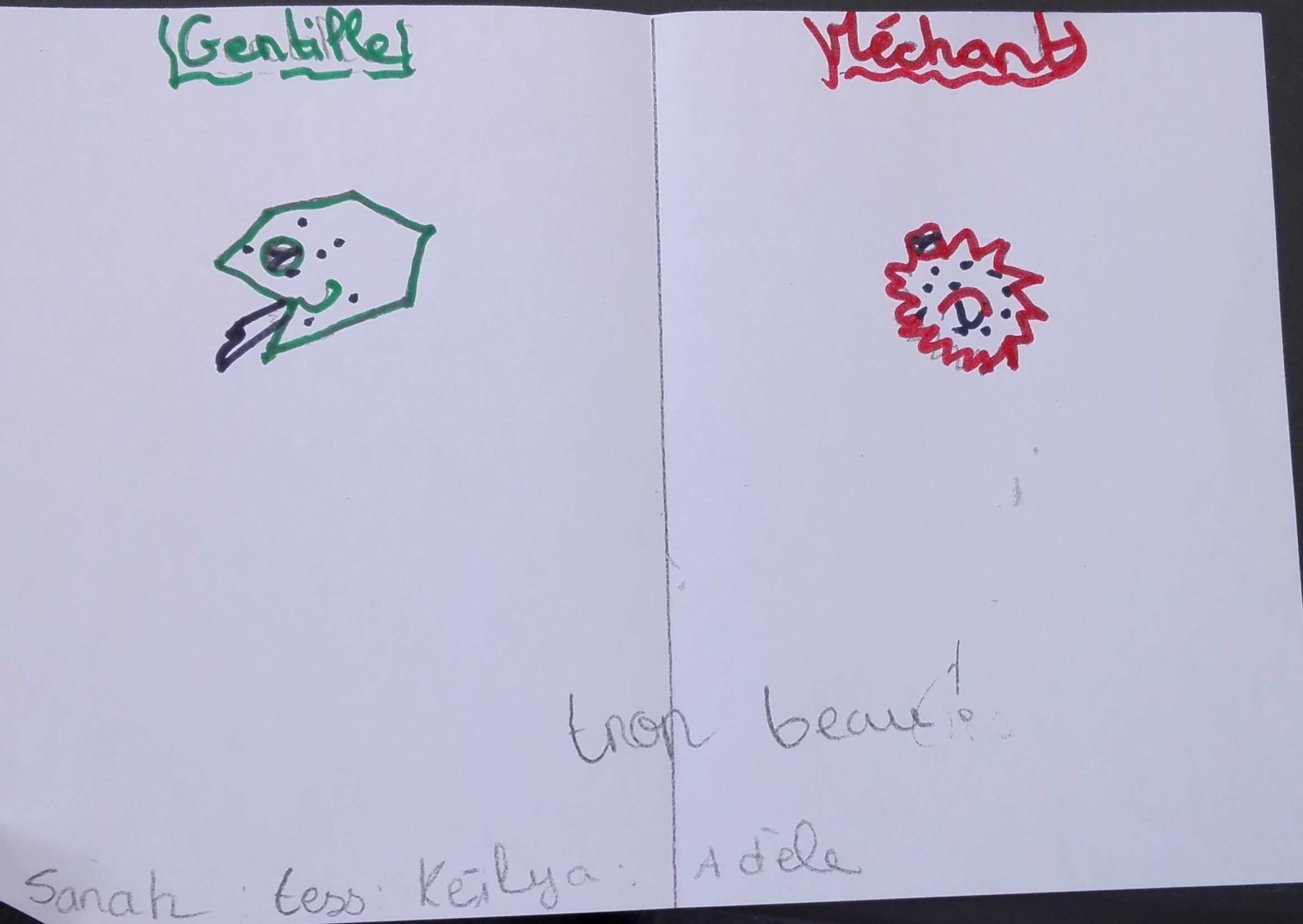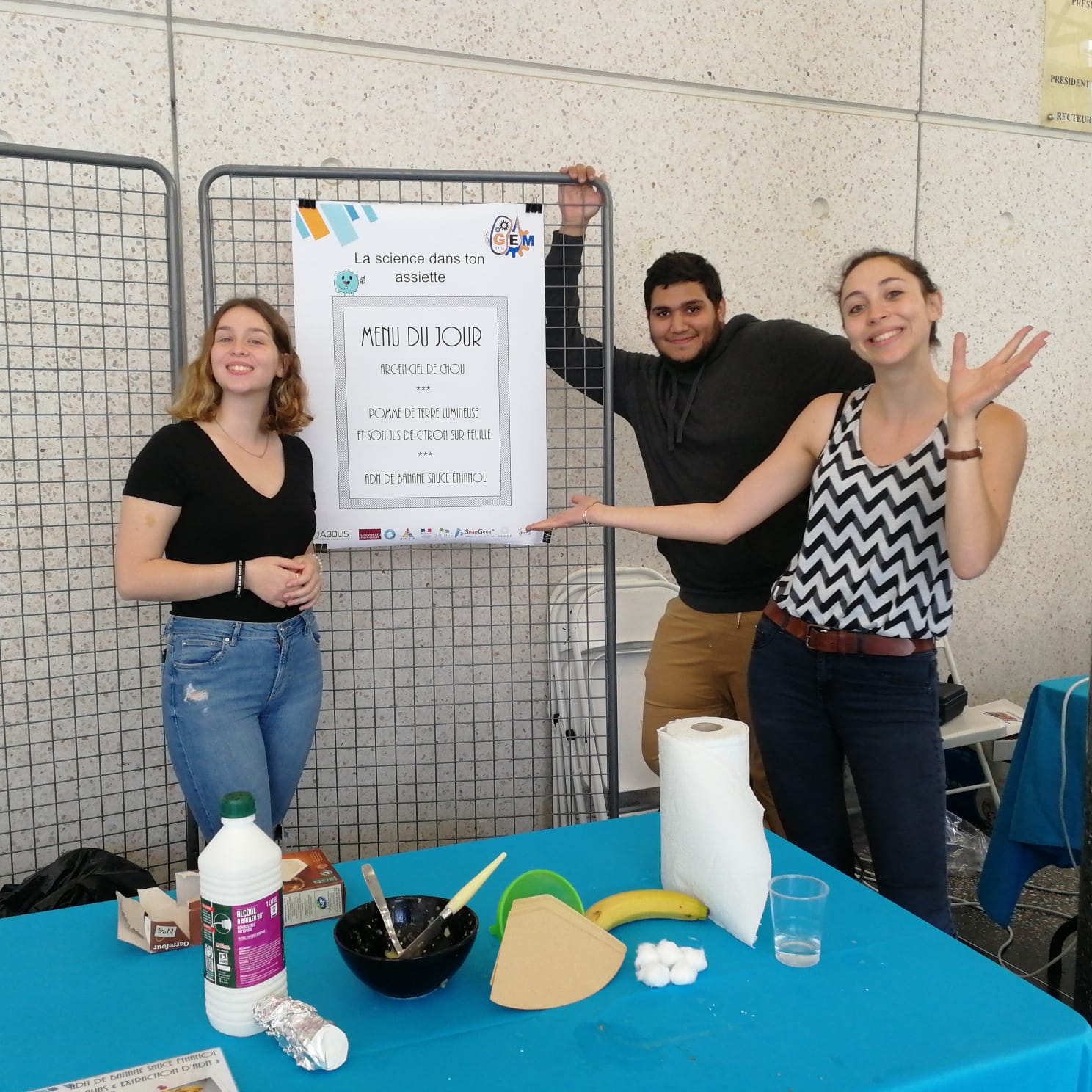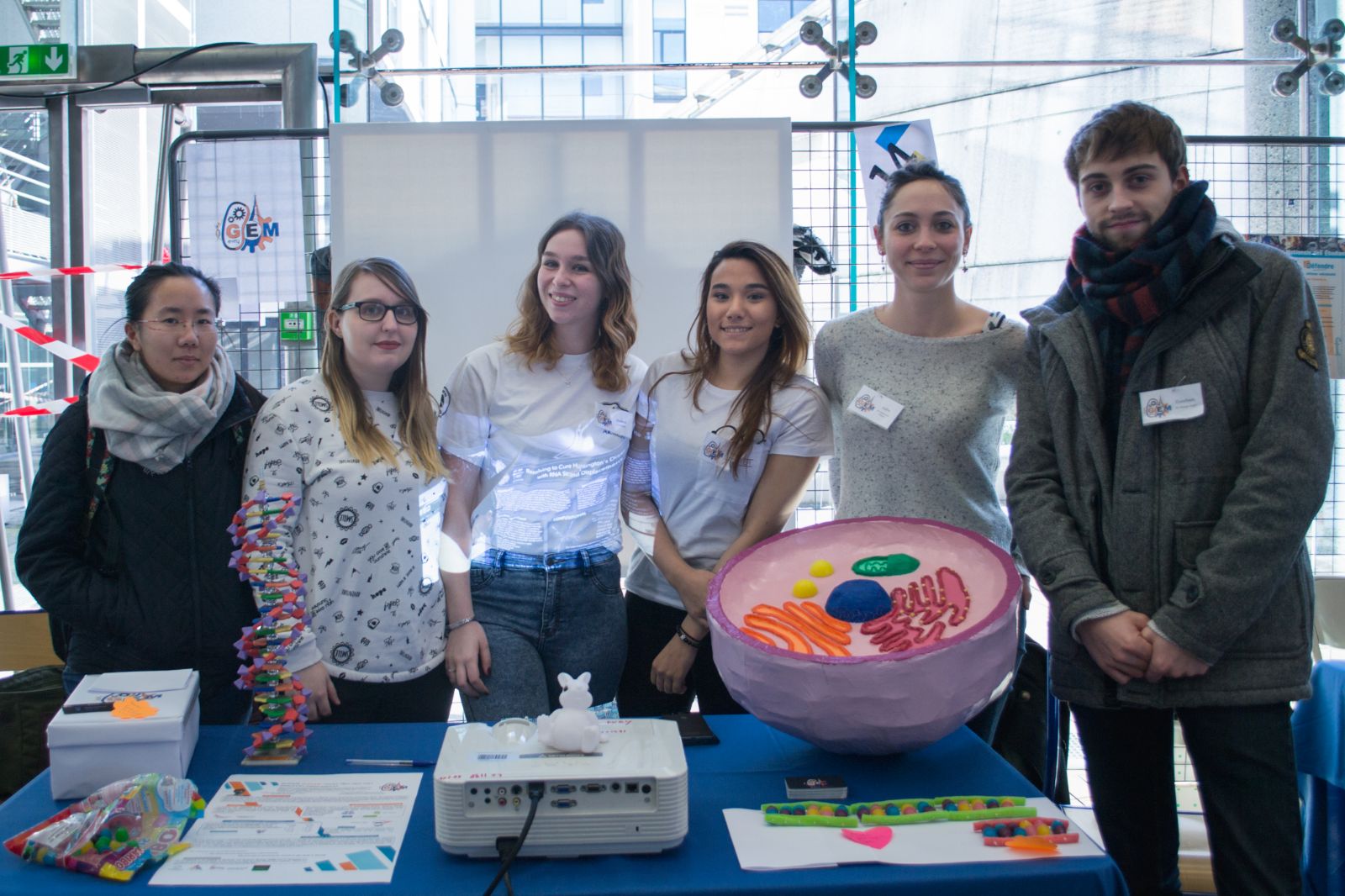EDUCATION AND PUBLIC ENGAGEMENT
In France, the general public and even first year bachelors students of biology seem to associate Biology to the observation of flora and fauna. We tried to speak to a large target audience, including people who had been previously introduced to the synthetic biology and those who hadn’t. Our aim was to popularize synthetic biology and its various applications.
We met people from different walks of life, whatever were their age, their professional or their social situation. In this way, we were able to introduce Fatima, 6 years old, to Biology and to make her understand the significant role of bacteria. We were able to help Camille, 21 years old and biology student, to learn more about laboratory practices. Not to forget Lucette, 81 years old, for whom Biology and the world of research were very abstract.
OUR INTERVENTION FOR KIDS FROM 3 TO 17 YEARS OLD
In June, we spent a week speaking and playing with kids from holiday centers as part of the Scienc’estival, an event we organised with Planète Science and the Les Ulis city. We worked with more than 150 kids from 3 to 15 years old.
The aim of our stand was adapted to the age-group of the kids. With the younger ones we tried to teach them the advantages and the disadvantages of bacteria. To do so, we asked them first to say what they thought bacteria were, and also to draw one. Then, we taught them difference between a “good” bacteria (“Gentille” in French) and a “bad” bacteria (“Méchant” in French). We also asked them to put their fingerprints in a Petri dish and showed them that bacteria were everywhere. Finally, we organised an Assault Course game, where the kids played bacteria that needed to bring to their team water, sugar and minerals without touching fire, antibiotics or bleach.
For the older kids, we organized same games and we also played a card game where they had to connect a bacterium to a disease, or to a product that came from it. The card game also included parasites, fungi and viruses. We also tried to introduce them to synthetic biology, demonstrating to them how to modify bacteria.

Drawing of Sarah with a “kind bacteria” in green and a “bad bacteria” in red. The green one is able to eat the red one thanks to her tongue but the red one has pikes which destroy the stomach of the kind bacteria.

Bacteria, as drawn by kids from 5 to 10 years old.

Sambavi, Adèle and Marine with a group of kids from a holiday center during the Scienc’estival.
In October, we participated in La Fête de la Science (literally the Science Party) in the University of Evry. La Fête de la Science is a french event of two weeks organised on the whole french territory. For this occasion, we spent two days with kids from 5 years old to teenagers of 16 years old, making scientific experiments with them using everyday products. We taught kids how to make an homemade pH indicator with red cabbage and how to extract DNA from fruits with the products present in their kitchen. Of course, we adapted the experiments according to the age of the kids and we encouraged them to reach scientific conclusions by themselves.

Solène, Yassine and Adèle at their stand at the Fête de la Science.

Yassine and Adèle with vocational baccalauréat students.
OUR INTERVENTION FOR A FAMILY AUDIENCE
In May, we participated in the Rond point des Sciences (literally the Sciences Roundabout) organised by Genopole in the shopping center of Evry.
During this intervention we presented our project in five minutes. Even if trying to attract the shoppers enough to pause their shopping was difficult, our presentation was nonetheless very successful. Several young adults came to see us at the end of our three presentations, sometimes with kids, to speak with us and to ask us for more details, even if our project was very difficult to understand for the uninitiated public.

Our intervention in the middle of the shopping center.

Our speakers from left to right : Axel, Adèle and Esteban.
During the Fête de la Science in October, we did not only see kids but we also saw mothers and fathers, as amazed as their children by the experiments we made with them.
After a talk with Guillaume HUTZLER, an Assistant Professor in the University of Evry belonging to the IBISC laboratory (Informatics, Integrative Biology and Complex Systems), we decided to create an interactive rug to make the larger public understand how logic gates works in a biological system:
OUR INTERVENTION FOR PREPARATORY STUDENTS
The intervention for preparatory students was something we really cared about because we had found that high-schoolers, and even first year biology students, seem to share the larger public’s has lack of knowledge and misconceptions about biology’s large scope of applications.
We participated in the Journée Portes Ouvertes (or open day) at the University of Evry Paris-Saclay. Our intent was clear: showing to future biology students that biology is not just about observing the flora and fauna and showing them that synthetic biology is a very large and interesting discipline.
To do so, we presented the project idea of our team and the projects of past iGEM teams of Evry Paris-Saclay. As the Journée Portes Ouvertes was too early to present our own project, we presented the project of the 2017 team and their adventure in Boston thanks to a video they made of their trip and their presentation in the U.S.
We also tried to introduce synthetic biology to the students using a candy-DNA system where students made their own BioBricks and transformed cells with their candy-DNA. After this introduction, we asked people to think about a project only feasible using tools of synthetic biology. While some funny and aesthetic projects like “the rainbow carrot” were proposed, other proposals were more application-oriented: like bacteria able to cure trees sick from Cameraria ohridella, or a biological gyroscope for space rockets.

Our synthetic biology recruiters : Suzanne, Marine, Solène, Nada, Adèle and Esteban.
OUR INTERVENTION FOR EXPERIENCED STUDENTS
We also wanted to work with experimental biology students and be helpful to them. That’s why we invited two students for an internship in our lab, who worked with our team. It was a clear success and the intern students became team members in their own right.
For instance, Camille, a biology student, needed to finish her last school year with an internship. She was interested in working on our project and with students, and not teachers, because she wanted to have the possibility of asking as many questions as she could without being afraid of a teacher’s judgment. Thanks to iGEM, she is now comfortable with lab experiments and she says herself that the team taught her a lot, and that she really loved working and learning with the team members.
In addition, we have continued a project initiated last year by the Evry Paris-Saclay 2017 team members called “BioLab Evry”. Indeed, we wanted to create an open-lab where people could practice and learn synthetic biology. Genopole, the first biocluster in France, is supporting us in this project and will accommodate it in its own building. We are currently looking for a manager and as soon as we find them, we will be able to open the doors of the lab to the public.
The BioLab has three key objectives: to teach synthetic biology to interested students and to give a new life to our previous iGEM projects by facilitating them to be advanced further by these students. This lab is also dedicated to school teachers who would like to learn from previous iGEM projects and share this knowledge with their students. Finally, It will host the iGEM teams of Evry and it will be a place where iGEM teams from the area will be able to meet and talk. We want this BioLab to be a place where ideas are born and where students and teachers learn from the past projects, to make a new one or to improve one.

OUR INTERVENTION FOR SENIORS FROM 75 TO 86 YEARS OLD
With the iGEM GO Paris-Saclay team, we were at a Seniors’ Residence to speak about synthetic biology, bacteria and medicine. 14 residents came to see us, aged from 75 to 86 years old. A senior even came with her grandson.
While our team presented synthetic biology and iGEM, showing the importance of bacteria and explaining why “the antibiotics are not automatics” (that is a headline from a french campaign against the abusive use of antibiotics), the iGEM GO Paris-Saclay team was in-charge of a presentation on the production of insulin using synthetic biology.
Of the different public groups we met, the Seniors turned out to be the most prejudiced against bacteria and GMOs. They saw bacteria only as bad bugs and thought GMOs were “bad things, only used by the big farmers enterprises”. But we were happy to see that, at the end of our presentation, they were enthusiastic to learn more about this branch of biology and its applications. They also asked to have more information about medicines created using GMOs.
Our presentation had another unexpected advantage for them: they did not know how efficient their hand-washing was. Indeed, we asked them to put their soap- and sanitiser-washed hands on a Petri dish and found that bacteria were very abundant on them. That’s why we proposed to the management to regularly remind the residents to clean their hands severals times a day, especially in the autumn and winter period when transmissible diseases are prolific and potentially dangerous for the elderly targets.

Julie and Arthur from the iGEM GO Paris-Saclay team and Esteban presenting about antibiotic resistance to the Seniors.

Julie and Arthur from the iGEM GO Paris-Saclay team and Adèle presenting synthetic biology to the Residents.
A VIDEO GAME FOR EVERYONE
We do believe iGEM is much more about straight science, but also about having fun with it. With that in mind we decided to produce a game as tool for disclosing of our project and for education purpose of subjects concerning molecular biology. Thus, we have chosen Stencyl as a platform to our game since it is a free tool aimed to education of computational thinking and an interactive community. Help ‘Pep’ to survive upon a Phage infection in “PHAGE WARS”. Tip: Pause the game and explore the actors with your mouse.
SAVE THE DATE! In the exhibition space at the Giant Jamboree 2018, go and play our game!
